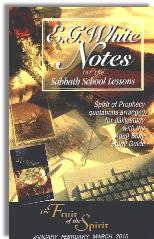|
||||||||||||||
Commentary on "The Fruit of the Spirit is Joy"
Day 7: Friday, January 15, 2010
Overview
Friday’s lesson offers this question for discussion: When we see the suffering in the world, and “when we know that many souls are going to be eternally lost, how much happiness should we have? Isn’t it kind of selfish to rejoice in our good fortune while we know that others will perish? Explain your answer.”
Observations
Is it selfish to “rejoice in our good fortune” when many suffer and others will be lost? The online dictionary defines “fortune” as “a prosperity attained partly through luck.” Most Christians would not characterize salvation as a matter of luck, since luck involves arbitrary, unpredictable forces are at work. Luck requires chance expressed in random events where there is no discernable cause.
There is an overwhelming amount of suffering in the world, as we see now after the earthquake in Haiti. How can we think of joy when so many suffer? The Apostle Paul was not blind to suffering, but he didn’t think it was “worthy to be compared with the glory that is to be revealed to us.” There is a larger plan working under all the suffering, the “revealing of the sons of God.”
“For the creation was subjected to futility, not willingly, but because of Him who subjected it, in hope that the creation itself also will be set free from its slavery to corruption into the freedom of the glory of the children of God.” Romans 8:20,21
The entire creation has been subjected to the futility of death. As a result, all of the created order, and all our best efforts turn to decay and destruction. Death is not just a natural consequence of sin and rebellion against natural or divine law. The universe does not run on its own, like the deists claim. Futility is a divine, judicial act imposed on the universe. We can see from Romans 8 and Genesis 3 that all creation is under a divine decree, a “curse” of decay. We didn’t will this, but received it by Him who subjected it to the futility of death. Suffering is the “groaning” of creation, feeling God’s curse from Adam’s sin.
We can also see that the creation has been subjected to futility in hope, but not by Adam, or Satan, or any finite being. This subjection is far too big to come from any lesser authorities. Nor is this a vain hope, or an “I hope so” kind of hope. This kind of hope has all the assurance and certainty of our sovereign God’s word, which cannot be undone. Only He can subject creation to futility in hope. This hope is the purpose of the whole creation’s suffering and groaning just as sure as childbirth will follow labor pains.
Our suffering is not in vain, however, because we have assurance that we will be freed from this slavery to decay and suffering to and be glorified as children of God. Jesus prayed for His children this way,
“Father, I desire that they also, whom You have given Me, be with Me where I am, so that they may see My glory which You have given Me.” John 17:24
It is safe to assume that Jesus will get everything He asks for in prayer. Here He is praying for everyone whom the Father has given to Him, to be where He is. Who are those “whom You have given Me?” All that come to Him and believe, and can say in their hearts, “Jesus is Lord.” Those are the ones who will be with Him.
Returning to our original question, we see that saved people are not “fortunate” people who are exempt from suffering. Nor are they saved by lucky, random events. God has exercised sovereign control of the creation’s suffering from the beginning, and He saves by His will and His grace. God will be glorified in all of this amazing history of pain and glory, and He is glorified whether we are saved or lost. There is no luck involved, and there is one discernable cause of it all—our Lord and King. When we finally see Him, all the comparisons will end.
Summary
- All the suffering we see is not worthy to be compared with the glory that God will reveal.
- As a result of sin, the entire creation has been subjected by God’s decree to the suffering and futility of death.
- God has also subjected the creation to futility in hope, and it is a hope of certainty.
- We can be certain that if we believe in Jesus as Lord, we will be glorified.
- Therefore, salvation is not a matter of “fortune” or luck, but a result of sovereign grace, and a plan which will glorify Him.
Copyright 2010 BibleStudiesForAdventists.com. All rights reserved. Revised January 15, 2010. This website is published by Life Assurance Ministries, Glendale, Arizona, USA, the publisher of Proclamation! Magazine. Contact email: BibleStudiesForAdventists@gmail.com.
The Sabbath School Bible Study Guide and the corresponding E.G. White Notes are published by Pacific Press Publishing Association, which is owned and operated by the Seventh-day Adventist church. The current quarter's editions are pictured above.
Official Adventist Resources
Standard Edition Study Guide Week 3
Teacher's Edition Study Guide Week 3
Easy Reading Edition Study Guide Week 3
Search the Complete Published Ellen G. White Writings


